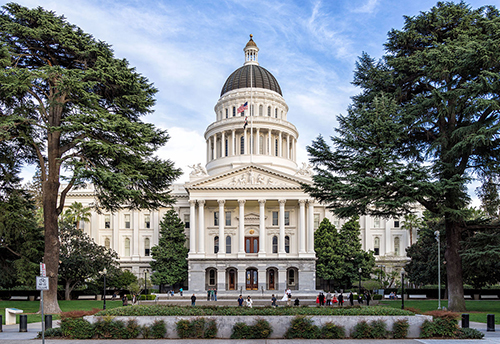Blog
The Worst Companies In America Make a Move on Marijuana
Some industries have made a name for themselves by being the best at being the worst. They sell products with a known body count, they have undermined science with fake experts, and they have bullied and manipulated legislatures into low-oversight, low-tax schemes that crippled public health response for a century or longer. And now they want in on the newest legal drug market—marijuana.
In mid-March 2021, the Coalition for Cannabis Policy, Education, and Regulation was launched, funded and overseen by a coalition of companies that include representatives from Big Alcohol (Constellation Brands and Molson Coors) and Big Tobacco (Altria, formerly Philip Morris). The Coalition explicitly states its intention to “guide cannabis legalization and regulation at the federal level.”
This is not a philanthropic effort. In-house industry documents show that the tobacco industry has been planning for the legalization of marijuana for the past fifty years, hoping to use it to boost flagging tobacco sales. Meanwhile, Constellation has already moved aggressively into the marijuana industry, obtaining a significant stake in medical marijuana brand Canopy. Molson Coors has also already forged a partnership with marijuana companies to develop a line of CBD products.
The Coalition touts its expertise in “regulatory and enforcement structures, state and legacy systems, financing and minority capital access, tax policy, criminal justice reform, [and] social equity … .” These are not empty claims. For over a century, Big Alcohol and Big Tobacco have created lasting harm in each of these domains. They have undermined regulatory schema. They have consolidated small companies to create transnational behemoths. Through endless lobbying and bottomless campaign coffers, they have crippled community abilities to offset harms by raising alcohol or tobacco taxes. By shifted liability for alcohol harms away from the companies and sales environments and on to individual consumers, they have made it cripplingly difficult to hold businesses accountable. Both alcohol and tobacco companies have invested billions in targeting ethnic, racial, and sexual minority groups.
In short, in every single one of these domains of expertise, Big Alcohol and Big Tobacco have mastered the art of increasing harm.
Responsible marijuana legislation simply cannot coexist with Big Alcohol or Big Tobacco’s interests. In terms of preventable causes of death worldwide, tobacco and alcohol use have rank first and third, even during the height of the opioid crisis. Even above the simple profit motive, evidence shows that mixing these industries with marijuana increases harms from the latter. Recent studies suggest that using alcohol with marijuana substantially increases the level of intoxication versus using either alone. Similarly, tobacco and marijuana co-users have a tougher time quitting either. This Coalition must either ban alcohol and tobacco interests, or make it clear where their interests lie: in making money and burying bodies.
READ MORE about the need to keep Big Alcohol out of the marijuana industry.
READ MORE about the lobbying power of Big Alcohol.
GUEST VOICES: 2020 Fails to Supply the Demand for Opioid Treatment
By Ramón Castellblanch, PhD
 The COVID-19 pandemic aggravated the opioid epidemic, both in terms of supply and demand. In terms of the supply, we took a terrible hit in the number of programs to fight it. As of September, their revenues were down by over 20%. With those losses, more than half of these programs were not sure that they’d still be operating this spring.
The COVID-19 pandemic aggravated the opioid epidemic, both in terms of supply and demand. In terms of the supply, we took a terrible hit in the number of programs to fight it. As of September, their revenues were down by over 20%. With those losses, more than half of these programs were not sure that they’d still be operating this spring.
At the same time, demand for substance use disorder (SUD) treatment skyrocketed under the COVID-19 pandemic. For the last three quarters reported, California’s opioid dashboard shows that opioid overdose deaths rose from 882 in the final quarter of 2019 to 1,255 in the second quarter of 2020, an increase of over 40%.
On the bright side, the state of California took some serious steps toward addressing the crisis. Its most notable achievement was in the area of funding SUD treatment. The enactment of SB 855 means that private insurers must cover it. At this beginning of this year, the state Department of Managed Health Care has directed the insurers to submit forms documenting their compliance by February 1.
CAPA Hears the WHO
Global Health Organization Calls on Allies to Craft New Plan for Stopping Alcohol Harm
 As Big Alcohol expand its reach across every continent, international cooperation becomes critical to protecting public health. No organizations have the capacity for coordination that the World Health Organization (WHO) does, and it is promising that they have identified alcohol harm as a priority. For over a decade, the organization has relied on a Global Strategy to Reduce the Harmful Use of Alcohol and targeted a 10% reduction in member states’ alcohol consumption. Nonetheless, WHO’s own evaluators drily note that it is “unlikely” that any members states will reach that benchmark. Clearly it is time to reassess the strategy.
As Big Alcohol expand its reach across every continent, international cooperation becomes critical to protecting public health. No organizations have the capacity for coordination that the World Health Organization (WHO) does, and it is promising that they have identified alcohol harm as a priority. For over a decade, the organization has relied on a Global Strategy to Reduce the Harmful Use of Alcohol and targeted a 10% reduction in member states’ alcohol consumption. Nonetheless, WHO’s own evaluators drily note that it is “unlikely” that any members states will reach that benchmark. Clearly it is time to reassess the strategy.
Conscious of this, the WHO issued a call for comment on a new iteration of the Global Strategy. Alcohol Justice and the California Alcohol Prevention Alliance were both invited to contribute. The letters of comment are attached below, but both emphasized:
1. The need for aggressive opposition towards the global alcohol industry.
2. An emphasis on social justice and equity when assessing alcohol impact and prevention, and amplifying the voices of indigenous minorities, LGBTQ communities, and other vulnerable populations.
3. CAPA and AJ project priorities, including Charge For Harm, advertising restrictions, and tighter control of products designed to promote overconsumption and youth access.
“We’re a small part of a worldwide fight,” said Carson Benowitz-Fredericks, Research Manager for Alcohol Justice, “against a very strong industry. But there are a lot of us across the globe. The WHO Global Strategy gives us a blueprint for coming together, pushing back, and saving lives.”
READ MORE – the original WHO Global Strategy to Reduce the Harmful Use of Alcohol document.
READ MORE – CAPA’s comments on the WHO Global Strategy.
READ MORE – Alcohol Justice’s comments on the WHO Global Strategy.
2020 California Legislative Roundup
 This past year was an odd one for legislation in general. COVID-19 relief took center stage, relegating much alcohol legislation to the backburner. At the same time, the California Department of Alcoholic Beverage Control (ABC) put forth a number of measures meant to make it easier for alcohol retailers to reach customers during lockdowns. Nonetheless, 2020 marked the end of the two-year legislative session, making it clear which bills would ultimately be signed into law and which would die on the vine.
This past year was an odd one for legislation in general. COVID-19 relief took center stage, relegating much alcohol legislation to the backburner. At the same time, the California Department of Alcoholic Beverage Control (ABC) put forth a number of measures meant to make it easier for alcohol retailers to reach customers during lockdowns. Nonetheless, 2020 marked the end of the two-year legislative session, making it clear which bills would ultimately be signed into law and which would die on the vine. Here is how Alcohol Justice and the California Alcohol Policy Alliance fared on its bills of significance in this session:
| PASSED | FAILED | |
| AJ Supported | 3 | 11 |
| AJ Opposed | 7 | 6 |
| CAPA Supported | 1 | 2 |
| CAPA Opposed | 1 | 1 |
Final legislative batting averages*
AJ: 0.333
CAPA: 0.400
*For arbitrary reference, the 2020 Major League Baseball mean batting average was 0.245, while the batting leader was DJ LeMahieu, with 0.364.
SUPPORT
Outside of legislation, AJ and CAPA have worked to strengthen ABC’s emergency powers to suspend licenses of alcohol outlets that pose immediate threats to public health and safety. This notably includes bars and restaurants that continue to seat diners indoors, without masks, and/or in close proximity despite public health orders meant to slow the spread of COVID-19. However, these powers can also be used by any licensee who deliberately flouts laws surrounding sales to youth, drug sales on the premises, dangerous environments, and similar immediate threats to the community.
Notable bills:
AB 362 would have legalized safe injection sites to help prevent overdose among individuals experiencing opioid use disorder, bridge them to needed services, and reduce the strain of opioid use on communities. A similar bill was vetoed by Jerry Brown in 2018. In 2020, unfortunately, AB 362 died in committee.
AB 1713, aka “Liam’s Law,” would have reduced the blood alcohol content threshold for DUI citation from 0.08 to 0.05 percent. The nationwide adoption of the lower threshold forms the basis of Alcohol Justice’s Point 05 Saves Lives project. The bill died in committee and the fight continues. READ MORE about Liam’s Law.
SB 525 would have required all convicted DUI offenders to get an ignition interlock device installed in their car, and would have provided state funding for offenders who were not able to afford one themselves. Ignition interlock devices require drivers to blow into them before starting the car. The devices measure blood alcohol content in the breath, and prevent the engine from starting if any is detected. The bill died in committee.
AB 1304 offered parole reductions to parolees with a history of opioid abuse disorder (OUD) who enroll in medication-assisted treatment (MAT) programs. MAT includes methadone and buprenorphine, prescription drugs that block opioid cravings and make it much easier for people experiencing OUD to seek counseling and hold down jobs. Opioid abuse, alcohol abuse, and recidivism create a tangled web, and both AJ and CAPA believed this bill would create significantly improved outcomes for individuals in the criminal justice system. The bill passed and was signed into law.
Other alcohol- and opioid-related bills supported by AJ:
AB 127 – Research on impaired driving. Passed and signed.
AB 397 – DUI cannabis, and DUI cannabis and another drug (alcohol), recast as two separate offenses. Passed and signed.
AB 551 – Details types of drugs coroner must screen for in deceased drivers, reported monthly to CHP. Vetoed.
AB 546 – Imposes restrictions on the sale and transfer of alcohol licenses. Died.
SB 12 – Establish 100 centers to address mental health needs of youth. Died.
SB 42 – Guarantees transport from county jail to rehab program or hospital. Vetoed.
SB 55 – Imposes 10 year gun ownership prohibition on those convicted of multiple alcohol intoxication violations. Died.
SB 283 – Details types of drugs coroner must screen for in deceased drivers, reported monthly to CHP. Died.
AB 3102 – New tied-house restrictions on spirits manufacturers. Died
AB 2608 – New requirements for alcohol license transfers. Died.
OPPOSE
Although not legislation per se, regulatory relief, a series of ABC decisions that weaken alcohol controls throughout the state, has drawn the majority of CAPA and AJ’s efforts in 2020. Of particular concern, these deregulatory measures include enhanced access to alcohol by delivery, expanded footprints for alcohol outlets, and opportunities for Big Alcohol to engage in marketing and market control under the guise of COVID-19 prevention. READ MORE about AJ and CAPA's opposition to regulatory relief measures.
Notable bills:
AB 205 allows alcohol manufacturers to pay beer-level excise taxes when using sugars, honeys, or fruit products to create alcoholic beverages. Beer manufacturers pay by far the lowest excise taxes of any alcohol producer, and this bill opened the door for a host of “beer like” brewers to enjoy the same cut rates. Seeing as alcohol excise taxes do not rise over time, and no legislation to raise them has been introduced since 1991, it is irresponsible in general to create new legislative loopholes to lower them. This bill threatens to incentivize the production of hard seltzers, hard sodas, and other non-beer youth-friendly “beginner” alcoholic beverages, and was opposed by both AJ and CAPA. Unfortunately, it passed and was signed into law.
SB 21 lowered the threshold of beer production a brewpub must engage in to receive a full liquor license. Brewpubs occupy a special tier of license that allows restaurants to have a full bar (not just sell their own products) as long as they are ostensibly serving beer they brew themselves. A recent investigation by ABC revealed rampant fraud by license holders, and the minimum production to be eligible for the license was raised legislatively in the prior session. This bill reversed that heightened requirement, once again creating a situation where these fraud-prone licenses are far too easy to acquire. AJ opposed, but the bill passed and was signed into law.
SB 50, Scott Wiener’s infamous 3 A.M. (neé 4 A.M.) Bar Bill, would allow bars in the most heavily populated areas of the state to keep serving late into the night. The bill, which Wiener has introduced every year since 2017, threatened to greatly increase violence, disruption, injury, and automobile crashes across a wide swath of the state. AJ and CAPA have consistently opposed it alongside a wide range of public health and safety organizations. Once again it was defeated in 2020, this time having died in committee. READ MORE about the 4 A.M. Bar Bill.
Other alcohol- and opioid-related bills opposed by AJ:
AB 436 – “District bill” allows alcohol sales at City of Napa performing arts venue. Passed and signed.
AB 475 – Allows on-sale beer and wine paint and sip license to premises for the primary purpose of art events or art classes. Died.
AB 1133 – Free branded beer glasses for licensees from producers. Passed and signed.
AB 1356 – Forces commercial marijuana facilities in cities or counties against their local authority and best interests of their residents. Died.
SB 264 – Doubles locations for winegrower or brandy maker to sell products and provide tastings. Died.
SB 352 – Alcoholic beverage licensees: on-sale general licenses for bona fide eating places. Died.
SB 717 – Allows distillers to provide free advertising to certain licensees. Passed and signed.
SB 788 – Alcoholic beverages: appeals: decision: tied-house restrictions. Passed and signed.
AB 2459 – District bill to allow ten more on-site licenses in Mariposa & Napa Counties. Passed and signed.
AB 2957 – Would allow winegrowers to sell wine in containers provided by customers. Died.
As you read this, the California legislature is introducing new bill; like every year, some will shift ever more power to Big Alcohol, while others will be desperately needed brakes on the toll harmful drinking takes on the state. Of particular note, we expect the industry to make an aggressive push to make regulatory relief permanent even after the COVID-19 crisis has passed. AJ and CAPA will, as always, work to stop bad legislation, support protective legislation, and mobilize communities to create a healthier, safer, and saner California.
More Articles ...
Help us hold Big Alcohol accountable for the harm its products cause.
| GET ACTION ALERTS AND eNEWS |
STAY CONNECTED    |
CONTACT US 24 Belvedere St. San Rafael, CA 94901 415-456-5692 |
SUPPORT US Terms of Service & Privacy Policy |


